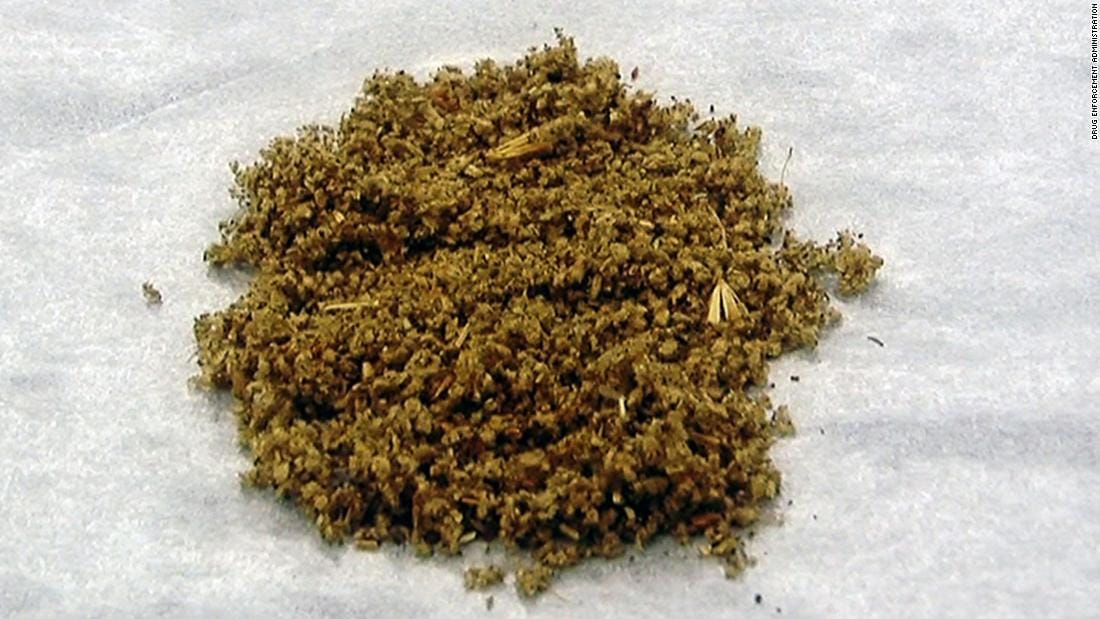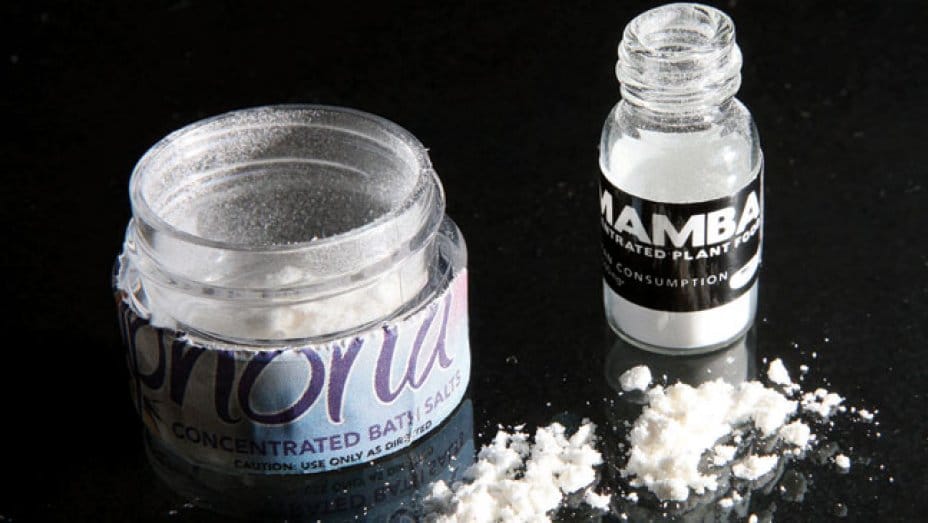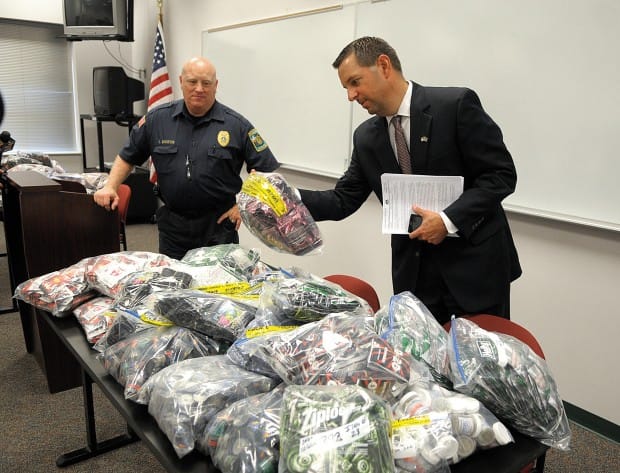
In 2017, there were 158 reported K2 overdoses in Lancaster, Pennsylvania over the course of just one week. Again, in May 2018, the city experienced an upswing of reported K2 overdoses. In the preceding months, the reported number of K2 overdoses has remained extremely high- occasionally surpassing the number of opioid overdoses reported in the region. We will explore the use of K2 and bath salts in our region, and how law enforcement is working to reduce the spread of synthetic drugs.
K2

Synthetic marijuana, known colloquially as K2, Spice, or incense, is normally made from shredded plant material and lab-made cannabinoids. These cannabinoids are designed to mimic the effects of THC, but do not register on traditional drug tests.
The user high from synthetic marijuana is often nothing like the typical organic marijuana high because K2 is far more powerful than any strain of marijuana that a person could find on the street. The cannabinoid compound can be up to 800 times more powerful than organic marijuana.
Manufacturers of synthetic marijuana must constantly alter their compound in order to circumvent the law; therefore, it is impossible to tell how strong the particular product’s compound will be. Because of this ever-evolving compound, the substance will likely have different effects over the course of multiple uses.
Say, for example, a woman has used a synthetic marijuana product called “Winter Haze”. A few months later, this same woman chooses to purchase “Winter Haze” again. Though it appears to be the same product, the compound is most likely different. There is no guarantee that this compound has the same potency as the compound in the “Winter Haze” product purchased months prior. Accordingly, the woman has no way of knowing how the product will affect her.
Though all strains of synthetic marijuana are now illegal according to Pennsylvania law, K2’s history of accessibility coupled with its low price lead many to believe that the product is legal and safe. Some men and women choose to use synthetic marijuana as an alternative to organic marijuana in order to pass a drug test. Some turn to synthetic drugs when their stronger drug of choice is unavailable.
The potency and unpredictability of synthetic marijuana makes the drug particularly dangerous. K2 can make some users violent, suicidal, and enraged; other users have reported repeated vomiting and an increased heart beat; many experience extreme anxiety and paranoia. The Lancaster Police Department responded to several emergency calls where synthetic marijuana users were in a catatonic state.
The misnomer that K2 is a safe and legal substance encourages some to regularly use the drug. In fact, synthetic marijuana is extremely destructive and addictive. Withdrawal from K2 is physical and mental. Medical supervision is required for individuals attempting to end their physical dependence on the substance.
Bath Salts

Bath salts are comprised of compounds that can be legally bought separately, but are not safe for human consumption. The synthetic cathinones in the substance aim to mimic the effects of cocaine and methamphetamines.
To a certain degree, bath salts can make the user feel as if he or she were under the influence of cocaine or methamphetamines. The substance is an “upper” and is known to cause increased sociability, excitability, and sex-drive. Bath salts experienced a surge of popularity because, compared to cocaine and amphetamine, the drug is much more accessible and much less expensive.
Like K2, the composition of bath salts is constantly evolving in order to circumvent the law. This variation makes overdose far more likely because even regular users can easily take too much of a new, stronger variation of the substance. Like K2, it is impossible for users to determine the potency of the substance before consumption. Furthermore, because the compounds found in bath salts are not safe for human consumption, toxicity is the leading cause of death from bath salts.
Like many other narcotics, bath salts can chemically induce a euphoric state. Bath salts cause an influx of dopamine, the neurotransmitter responsible for feelings of pleasure and reward, to be released by the brain. The amount of dopamine released by bath salts is greater than many other comparable narcotics- for example; ten times the amount of dopamine is released by the brain while under the influence of bath salts than while under the influence of cocaine.
While an increase of dopamine may result in an initial sensation of pleasure, the sudden surge of dopamine in the brain caused by bath salts has dangerous consequences. The unnatural, accelerated release of dopamine causes many users to hallucinate, which can severely intensify the feelings of paranoia and anxiety known to accompany a bath salts-induced high.
The conflicting and unusual combination of compounds present in the drug can result in a euphoria state that quickly erodes into an episode of excited delirium. The high can result in feelings of extreme strength and an inability to feel pain. Many feel invincible or crazed; many strip off clothing, and manically tear at their skin or body parts. Users are prone to violence towards themselves and others during these episodes of excited delirium.
The bizarre and violent behavior of individuals under the influence of bath salts has been in national news since 2010. Many will recall a sensationalized 2012 news story from Florida of a 31-year-old “zombie” man who reportedly ate another man’s face while under the influence of bath salts. Over the last decade, an increasing number of murders, suicides, and random attacks have been credited to the use of bath salts.


It may be true that some news reporting, by failing to consider the impact of existing untreated mental health issues, confuse correlation and causation regarding the role of bath salts in these crimes. However, it can definitively be said that some users may be driven to reckless and irrational behavior by the hallucinations, paranoia, anxiety, and excited delirium that accompany a bath salts-induced high.
Just in June of this year, a Clinton County couple was arrested on several charges while engaging in reckless and irrational behavior after allegedly consuming bath salts. A Centre Daily Times article reports that the 22-year-old woman and 30-year-old man broke into and entered the homes of two neighboring families while wielding a firearm. The couple believed that the green lights in the night sky were not fireflies, but were alien laser beams. The couple asked the residents in the first home to call 911 because “someone was messing with them”, and asked residents in the second home permission to take a shower to get the burning “goo” off of their skin. Though the man did shoot the firearm into the sky, no one was injured.
While this incident did not result in any injuries, it helps us to understand how those under the influence of bath salts can occasionally engage in unintentional violent acts. Similarly to K2, bath salts’ history of affordability and accessibility lead many to believe that the drug is legal and approved for human consumption. Though there has been substantial media coverage on the dangers of the drug, the truth of such claims can quickly be dismissed as sensationalized reporting. The reality is that bath salts are illegal, unapproved for human consumption, and known to induce states that may cause some users to engage in irrational and violent behavior.
Synthetic Drug Laws in PA

The manufacturers of substances like K2 and bath salts were once able to keep their products legal by constantly changing its chemical makeup. Once the legislature was able to pass a measure that made one specific compound illegal, the manufacturers would alter the compound in attempt to circumvent the law.
A “blanket law” was passed in 2013 which explicitly prohibited designer drugs, and provided a purposefully vague definition for the classification. Now, in Pennsylvania, manufacturers are no longer able to manipulate the compound of a product in order to adapt to changing legislation. Though most drugs like K2 and bath salts are now prohibited by law regardless of the chemical composition, incidents like the 2017 record week of K2 overdoses in Lancaster and the bizarre and destructive behavior of the Clinton County couple prove that designer drugs continue to plague Pennsylvania communities.
Local, state, and federal police have made concerted efforts to target the proliferation of designer drugs at the source. In March of 2018, three shipments of synthetic drugs were seized in Chicago. The packages, which contained both K2 and bath salts, were shipped from China and heading to Allegheny County. Law enforcement agencies around the state have identified the elimination of synthetic drugs as a high priority.
If you or a loved one has been charged with a drug crime, it is important to contact an experienced and dedicated attorney right away. Attorney Julian Allatt has vast experience defending private and indigent clients charged with an array of drug crimes in the Central Pennsylvania region. Fill out a contact form or call the law offices of Rehmeyer & Allatt for a free consultation.
To learn more about laws against the possession, distribution and manufacture of synthetic drugs like bath salts and K2 in Pennsylvania, read this blog post.
On resources for those suffering from addiction, please consult this page.
